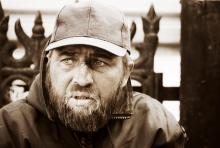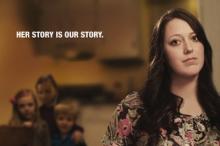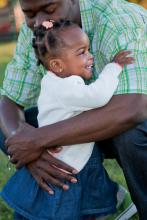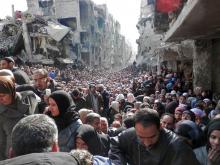Poverty

This Holy Week, I realized God's hope in a place other than church.
Proclaiming that the tomb is empty – that Jesus has risen from the grave – is the most powerful witness any Christian can offer. But if our Easter celebration stops at proclamation then we’ve shortchanged the world of the hope and joy it sorely needs. The resurrection must also be about embodiment. It should change the way we live and move and have our being. Easter should transform and strengthen us to participate in God’s reconciling work in the world.
That’s why I chose to spend this Easter worshipping in a very different way and in a very different place. There was no midnight watch service or large family dinner, but there were countless moments of hope and an abiding trust in the possibility of new life.

The United States hosts more than 23,000 payday lending stores, which outnumbers the combined total of McDonald’s, Burger King, Sears, J.C. Penney, and Target stores. These payday lenders do not make conventional loans as seen in most banks, but instead offer short-term loan amounts for short periods of time, usually until the borrower’s next paycheck, hence the name “payday loans.”
While some borrowers benefit from this otherwise unavailable source of short-term and small-amount credit, the payday lending business model fosters harmful serial borrowing and the allowable interest rates drain assets from financially pressured people. For example, in Minnesota the average payday loan size is approximately $380, and the total cost of borrowing this amount for two weeks computes to an appalling 273 percent annual percentage rate (APR). The Minnesota Commerce Department reveals that the typical payday loan borrower takes an average of 10 loans per year, and is in debt for 20 weeks or more at triple-digit APRs. As a result, for a $380 loan, that translates to $397.90 in charges, plus the amount of the principal, which is nearly $800 in total charges.





Last weekend, I had the opportunity to spend the night at the Metropolitan House Men’s Shelter, part of Washington, D.C.’s, Metropolitan Memorial United Methodist Church.
And in this experience, Henri Nouwen’s, In the Name of Jesus came to life for me. In reflecting on his own experience of transitioning from Harvard University to L’Arche, a house for mentally disabled individuals, Nouwen realized he had to rediscover his true identity. Up until that moment, Nouwen relied on his accomplishments, achievements, accolades, educational training, and social connections to legitimize his impact and reputation in ministry as a priest. However, at L’Arche none of the things he relied on seemed to matter, and he had to gain credibility with those he planned to serve — the mentally disabled. Nouwen states, “I was suddenly faced with my naked self, open for affirmations and rejections, hugs and punches, smiles and tears, all dependent simply on how I was perceived at the moment” (28). Nouwen was forced to let go of his “relevant” self. Nouwen defines relevant self as, “the self that can do things, show things, prove things, build things.” Nouwen would have to allow himself to become vulnerable while suppressing his “relevant” self.

“There is no room for hate in love.” – A wise girlfriend once told me to remember that.
Let it land.
Soak it in.
She’s right. But, I would add another line: “There is also no room for judgment and shame in love.”
I just made a film, Paycheck to Paycheck, about an inspiring and courageous woman named Katrina Gilbert. It’s the kind of film that I believe will stay with you long after you see it.
For me, joy in the everyday begins with food. If I can take time to make food and drink holy, if I make my table a place of family and community, a place of health and wellness, a place of good choices that sustain creation, I am grounded. Food is the place where I began my journey towards social justice, as a self-righteous young vegetarian who lusted after meat.
Food is the thing we all have in common, and with it, Jesus set forth the Eucharist. Is that enough for you to believe food is important?
Do you ever wonder why Paul spends so much time advising his churches on food and dinner manners? It's because the Eucharist was a wine-and-bread-leavened feast that intentionally leveled the strict hierarchy of Roman society. This enables Paul to confidently state, "There is no longer Jew or Greek, there is no longer slave or free, there is no longer male and female; for all of you are one in Christ Jesus."

In the days before video games, we had tabletop games that were a lot of fun despite their built-in shortcomings. We had an electric football game with a vibrating field; sometimes, the players would go in circles or simply stop in place. There was a hockey game with long rods that were pushed and pulled to make players advance or retreat, then spun to make them whirl and shoot; occasionally, the puck would wind up in a dead space on the board.
At those moments, you had two choices: Call a timeout, or raise your legs a bit to tilt the table and get the player or the puck headed in the other direction.
Naturally, this was frowned upon. It was seen as cheating — giving yourself an advantage. If you got caught raising the table, you were penalized. A tilted table was considered unfair.
In real life, we all sit at tilted tables.

SOON AFTER Dr. Michael Hendryx assumed a professorship of health policy management at West Virginia University, he started hearing stories of sick people in Appalachian communities near mountaintop removal coal mining operations. Finding no scientific research that examined the correlation between mountaintop removal and community health, Hendryx and his colleagues began overseeing family health surveys and compiling health data from the Centers for Disease Control and Prevention.
Since 2011, Peter Illyn of Restoring Eden (Christians for Environmental Stewardship) has recruited and led student volunteers from Catholic and evangelical Christian colleges in conducting door-to-door community health surveys for Hendryx’s research. Typical volunteer experiences, according to Illyn, include “aha” epiphanies and deepening conversions to God’s justice. Alex Gerrish, a recent Samford University (Birmingham, Ala.) graduate, recalls a searing experience. Her survey team visited a home located close by two mountaintop removal (MTR) operations, where a mother answered the door. She said, “I’m trying to get my son down for a nap,” explaining that her two-year-old had a heart defect. “Now’s not a good time to talk.” Two days later the team revisited the home to be met by an older, tear-stained woman. “I’m sorry,” she said. “My grandson passed away a couple days ago.” He never woke up from his nap. As Gerrish stood in shock, she recalled the statistics on high birth-defect rates in communities with mountaintop removal operations.
Now, more than two dozen published peer-reviewed studies show a high correlation between populations living amid MTR operations and very high rates of morbidity, asthma, chronic obstructive pulmonary disease, heart disease, cancer, and birth defects.







NEARLY 50 YEARS ago, the U.S. Department of Labor issued one of the most controversial and influential reports of our time, “The Negro Family: The Case for National Action,” aka “The Moynihan Report,” named after its author Daniel Patrick Moynihan. The March 1965 report offered our nation’s first comprehensive look at the roots of poverty in the African-American community 100 years after the Civil War. The picture wasn’t pretty.
Pointing to black poverty’s roots, Moynihan started with the hell that was the U.S. slave system: “American slavery was profoundly different from, and in its lasting effects on individuals and their children, indescribably worse than, any recorded servitude, ancient or modern.” Going on to quote Nathan Glazer, Moynihan illuminated the absolute powerlessness and dehumanization of enslaved black people under antebellum law and within the social structures of slavery.
Moynihan went on to examine the impact of the Reconstruction period, urbanization, unemployment, and inequitable wages on African Americans’ economic station in U.S. society. He concluded that the single greatest result of these forces was black families’ demise. And the single greatest result of this demise was entrenched poverty, according to Moynihan.
A 2013 Urban Institute report, “The Moynihan Report Revisited,” reflected that in the early 1960s Moynihan was alarmed that 20 percent of black children lived in single parent households with their mothers (not their fathers), but by 2010, 20 percent of white families lived in such households while 53 percent of black children were being raised by their mothers. According to the Urban Institute, fatherlessness in the U.S. has gotten worse, and it is no respecter of race.

Last week amid the closing of the Olympics, the national debt, and the latest pop culture ‘news,’ this photo was published that encapsulates the volume of pain and suffering that is happening in Syria. For years, the conflict in Syria has gone through its ebbs and flows; it has been in and out of the media’s attention. Even though thousands of people have been displaced and families have been forced to eat animal feed, this is not worthy for American front-page news. Sadly, travesties around the world, or even in our backyard, are categorized as “out of sight, out of mind.” Too often we are consumed by other things than those outside of our limited purview.
When I saw the photo of the suffering of the Syrians, I was shocked; I was shocked that so many people were in line to get food, shocked that despite their best efforts there is not enough food to go around. I felt sad for the people who, by no fault of their own, live in a country that is being ravaged by war, violence, greed, and power struggles. I felt embarrassed for all of the times I whined and complained about my own “problems.” All of them collectively wouldn’t even begin to compare to what people are facing in Syria at this very moment. I wanted to find a way to do something, to raise my voice for them ... anything.
